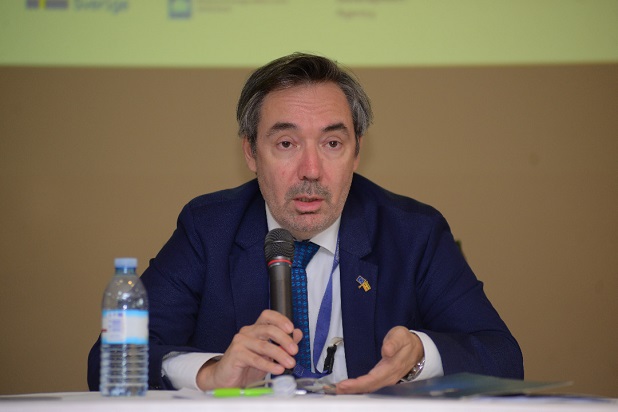Lennart Deridder, Acting Head of Cooperation – EU Delegation speaking at the conference yesterday
EDFI ElectriFI, the Electrification Financing Initiative funded by the EU, has committed circa EUR 5 million (Shs18.5billion) to bring electricity to underserved communities in Uganda.
ElectriFi is an impact fund bridging the financial gap in terms of equity, quasi-equity and debt to private companies investing in rural electrification, commercial and industrial captive power, productive use of energy, e-mobility and independent power producers, amongst others. Established in partnership with European Union Delegations and host governments, ElectriFI Country Windows offer dedicated funding for selected countries, in line with national objectives.
In December 2020, the EU and EDFI ElectriFI agreed on establishing a dedicated ElectriFI Country Window for Uganda, with a specific funding package of EUR 5 million, to be invested in renewable energy companies active in Uganda.
Yesterday’s launch of the Uganda Country Window will enable Uganda’s capacity to usher in its electricity generating potential and step up its efforts to mobilise renewable energy resources while tapping into private sector funding.
This support provided by the European Union will contribute to Uganda’s efforts to unlock significant economic, social and environmental development opportunities and to tackle various challenges such as loss of forests, biodiversity and soil fertility due to the massive use of charcoal.
In the last 5 years the EU has set up a programme to support Uganda’s energy sector worth more than 100 million EUR that – in a Team Europe Approach together with its Member States – has leveraged an additional 1billion EUR.
Speaking at the launch of the Uganda Country Window during the Renewable Energy Conference 2022 yesterday, Lennart Deridder, Acting Head of Cooperation – EU Delegation, said Uganda is richly endowed with renewable energy resources.
The total estimated potential is about 5,300 MW of electricity generating capacity.
“This is equivalent to 5 nuclear power plants. These resources, however, remain largely unexploited,” Deridder said.
He added that hydropower and biomass are considered to have the largest potential for electricity generation.
“But also solar power receives increasing attention by investors. Moreover, located in the East African Rift Valley, Uganda has promising potential for the exploit geothermal energy,” he said.
He revealed that the EU has implemented during the last 5 years a programme to support the energy sector worth more than 100 million EUR that – in a Team Europe Approach together with its Member States has leveraged an additional 1billion EUR.
“This covers the promotion of Independent Power Producers resulting in the installation of an additional 158 MW, a programme dedicated to Rural Electricity Connections, the construction of transmissions lines (Masaka-Mbarara, Mbale-Bumbi), Mini-grids in Northern and Western Uganda, and the Achwa hydropower plant (42MW),” he said.
“The EU will continue to support the electrification efforts of Uganda by mobilizing an additional envelope of 40 million Euro to support a new last mile connection to the electricity grid, the promotion of clean cooking, improved water management on the Nile or rehabilitation of the Nalubaale hydropower plant,” Deridder said.





